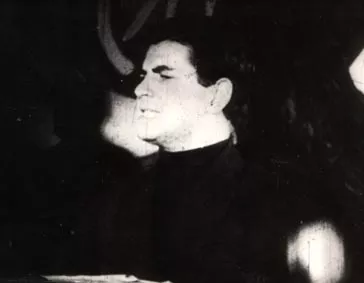Joseph Perlov
This is my, Alexander Tsvey’s uncle, mother's brother Joseph Perlov. He’s taking floor at the meeting held at the plant, where he worked. Once in 1956-1958 I turned on TV and accidentally saw a newsreel of 1934 or 1935, where the meeting at the plant was demonstrated. I saw my uncle Joseph Perlov among those, who held the speech. Mother and I addressed to TV and we were given the snapshot from the movie, made in the middle 1930s in Moscow.
My mother's family lived in a Jewish town Drissa [now Verkhnedvinsk, Belarus, about 220 km from Minsk. ]. Mother's father Israel Perlov was the most revered man in the Jewish community of the town. I do not know what he did for a living. I did not know my maternal grandmother, not even her first name. Her maiden name was Novik. Grandparents had four children. Haim was the eldest (in Russian Efim), born in 1900. In 1902 my mother Tsilya Perlovà was born. Her Russian name was Sima. After my mother two sons were born: in 1904 Fayvel or Fyodor in Russian and 1907 the youngest Joseph was born. Grandmother died when she was giving birth to Joseph. Of course, it was hard for the widowed grandfather to take care of four small children. When the mourning period was over, he was married to the widow with a child. In 1916 their common child, Mikhail, was born . In 1918 grandfather died. Mother remained a full orphan at the age of 16. She did not even manage to finish secondary school. Mother and her brothers were totally unreligious.
Mother's elder brother Efim finished vocational school. Then he left for Moscow. He must have insisted that mother also moved with him to Moscow. Efim did not have his place at that time, so he rented a room in house where common people lived. Efim was involved in commerce in Moscow and was promoted rather swiftly. He was assigned deputy chairman of the all-union procurement organization Tsentrosoyuz, which bought out and sold production manufactured by different small-scale companies. Efim had a personal car, which was rare back in that time. He was assigned to the same post after World War II as well.
When Uncle Efim became a dignitary, he was literally made to join the party. He also talked his younger brothers Fyodor and Joseph into moving to Moscow. Efim took good care of them as they were poor orphans. Joseph was an active Komsomol member. He married a Jewish girl Sara, also Komsomol member. Joseph was a passionate orator, devoted to the ideas of the party and revolution. He was a political go-getter. In 1934 he became the secretary of the party committee of one of the largest plants in Moscow (I do not remember which one). Then he was assigned the secretary of the regional party committee and then later on the secretary of Kursk [about 450 km to the south from Moscow] municipal party committee. Joseph did very well before the outbreak of repressions [Great Terror]. Then in 1938 there was a brief article in the paper "The Secretary of Kursk municipal party committee is mistaken", wherein Joseph was unfairly castigated. He went to Moscow to seek truth and did not come back. He was arrested and in 1938 shot without trial. We found about it only in the 1960s when we got his rehabilitation certificate, but back in 1937 mother had been staying by walls of NKVD days and nights and still did not manage to find anything about the brother. They even did not let her give him a parcel with the rusks and tobacco. I had never met a more decent and honest man than my uncle Joseph. Two of Joseph's children survived- sons Vladimir and Stanislav. Vladimir now lives in Israel. I correspond with him. Stanislav immigrated to the USA in the 1990s.


















